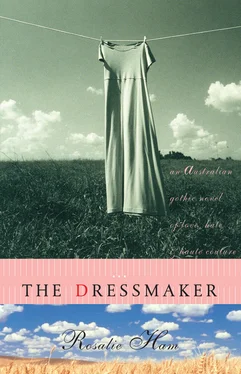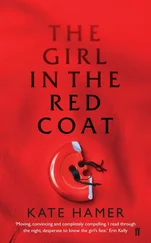Rosalie Ham - The Dressmaker
Здесь есть возможность читать онлайн «Rosalie Ham - The Dressmaker» весь текст электронной книги совершенно бесплатно (целиком полную версию без сокращений). В некоторых случаях можно слушать аудио, скачать через торрент в формате fb2 и присутствует краткое содержание. Год выпуска: 2000, ISBN: 2000, Издательство: Duffy & Snellgrove, Жанр: Историческая проза, Современная проза, на английском языке. Описание произведения, (предисловие) а так же отзывы посетителей доступны на портале библиотеки ЛибКат.
- Название:The Dressmaker
- Автор:
- Издательство:Duffy & Snellgrove
- Жанр:
- Год:2000
- ISBN:9781875989706
- Рейтинг книги:5 / 5. Голосов: 1
-
Избранное:Добавить в избранное
- Отзывы:
-
Ваша оценка:
- 100
- 1
- 2
- 3
- 4
- 5
The Dressmaker: краткое содержание, описание и аннотация
Предлагаем к чтению аннотацию, описание, краткое содержание или предисловие (зависит от того, что написал сам автор книги «The Dressmaker»). Если вы не нашли необходимую информацию о книге — напишите в комментариях, мы постараемся отыскать её.
The Dressmaker — читать онлайн бесплатно полную книгу (весь текст) целиком
Ниже представлен текст книги, разбитый по страницам. Система сохранения места последней прочитанной страницы, позволяет с удобством читать онлайн бесплатно книгу «The Dressmaker», без необходимости каждый раз заново искать на чём Вы остановились. Поставьте закладку, и сможете в любой момент перейти на страницу, на которой закончили чтение.
Интервал:
Закладка:
Elizabeth and Mary wrung a sheet, coiled like fat toffee between them. Margaret took it from them and slapped the wet sheet into the wicker basket. ‘Not fricassee rabbit again Mum!’
‘Very well then Princess Margaret, we’ll see if your brother Teddy can find us a pheasant and a couple of truffles out there in the waste – or perhaps you’d like a nice piece of venison?’
‘As a matter of fact I would,’ said Margaret.
Teddy emerged from the caravan with the twenty-two slung over his shoulder. He went to the yard behind the vegie patch and caught two slimy golden ferrets, put them into a cage and set off, three tiny Jack Russells at his heels.
• • •
Molly Dunnage woke to the sound of a fire crackling nearby and the possum thumping across the ceiling overhead. She wandered out to the kitchen, balancing against the wall. The thin girl was at the stove again, stirring poison in a pot. She sat in an old chair beside the stove and the girl held a bowl of porridge out to her. She turned her head away.
‘It’s not poisoned,’ said the girl, ‘everyone else has had some.’ Molly looked about the room. No one else was there.
‘What have you done to all my friends?’
‘They ate before they left,’ said Tilly and smiled at Molly. ‘There’s just you and me now, Mum.’
‘How long are you staying?’
‘Until I decide to go.’
‘There’s nothing here,’ said Molly.
‘There’s nothing anywhere.’ She put the bowl down in front of her mother.
Molly scooped a spoonful of porridge and said, ‘Why are you here?’
‘For peace and quiet,’ said the girl.
‘Fat chance,’ said Molly and flipped the spoonful of porridge at her. It stuck like hot tar to Tilly’s arm, burning and blistering.
Tilly tied a hanky across her nose and mouth and stretched an empty onion sack over her large straw hat, then gathered it about her neck with a bit of string. She shoved her trouser legs into her socks and pushed the empty barrow down to the tip. She climbed down into the pit and searched through the sodden papers and fetid food scraps, the flies seething about her. She was wrestling with a half submerged wheelchair when she heard a man’s voice.
‘We’ve got one of those at home, in full working order. You can have it.’
Tilly looked up at the young man. Three small brown and white dogs sat beside him, listening. He held a cage of writhing ferrets, and a gun and three dead rabbits dangled about his shoulders. He was a wiry bloke, not big, and wore his hat pushed back on his head.
‘I’m Ted McSwiney and you’re Myrtle Dunnage.’ He smiled. He had straight white teeth.
‘How do you know?’
‘I know a lot.’
‘Your mother, Mae isn’t it, looked in on Molly from time to time?’ asked Tilly.
‘From time to time.’
‘Tell her thanks.’ Tilly dug deeper, throwing fruit tins, dolls’ heads and bent bicycle wheels aside.
‘You tell her when you collect the wheelchair,’ he called.
She went on digging.
‘So you can come out of there now. That is, if you want to,’ he said.
She stood and sighed, waving away the flies from her onion sack. Teddy watched her scramble up through the rubbish on the far side of the pit, the side nearest the trench where his father emptied the night cans. He made his way around and was at the top of the bank when she got there. She straightened, looked up into Teddy’s face and overbalanced. He grabbed her, steadied her. They looked down into the bubbling brown pool.
She pulled free of him. ‘You gave me a fright,’ she said.
‘I’m the one should be frightened of you, isn’t that so?’ He winked, turned and whistled away along the bank.
At home Tilly tore off all her clothes and threw them into the flaming wood stove then soaked in a hot bath for a very long time. She thought about Teddy McSwiney, and wondered if the rest of the town would be as friendly. She was drying her hair by the fire when Molly tottered out from her room and said, ‘You’re back. Want a cup of tea?’
‘That’d be nice,’ said Tilly.
‘You can make me one too,’ said Molly and sat down. She picked up the poker and prodded the burning kindling, ‘See anyone you know at the tip?’ she sniggered.
Tilly poured boiling water from the kettle into the teapot and got two mugs from the cupboard.
‘You can’t keep anything secret here,’ said the old woman, ‘Everybody knows everything about everyone but no one ever tittle-tattles because then someone else’ll tell on them. But you don’t matter – it’s open slather on outcasts.’
‘You’re probably right,’ said Tilly and poured them sweet black tea.
In the morning an ancient wheelchair of battered cane, cracked leather and clanking steel wheels sat outside Tilly’s back door. It was freshly scrubbed and reeked of Dettol.
4
The next Saturday brought the match between Itheca and Winyerp. The winner would play Dungatar in the grand final the following week.
Tilly Dunnage had maintained her industrious battle until the house was scrubbed and shiny and the cupboards bare, all the tinned food eaten, and now Molly sat in the dappled sunlight at the end of the veranda in her wheelchair, the wisteria behind her just beginning to bud. Tilly tucked a tartan Onkaparinga rug over her mother’s knees.
‘I know your sort,’ said Molly, nodding and steepling her translucent fingers. As food had nourished her body and therefore her mind, some sense had returned to her. She realised she’d have to be crafty, employ stubborn resistance and subtle violence against this stronger woman who was determined to stay. Tilly smoothed Molly’s wayward grey hair and slung her dillybag over her shoulder, pushed a large-brimmed straw hat down on her head, put on dark glasses and pushed the chair off the veranda and over the buffalo tufts and yellow dandelions.
At the gateposts they paused and looked down. In the main street the Saturday shoppers came and went or stood about in groups. Tilly drew breath and pushed on. Molly held the wicker armrests and bellowed all the way to the bottom of The Hill. ‘So you are going to kill me,’ she cried.
‘No,’ said Tilly and wiped her sweaty palms on her trousers. ‘The others were happy to let you die, I saved you. It’s me they’ll try to kill now.’
When they rounded the corner to the main street they stopped again. Lois Pickett, fat and pimply, and Beula Harridene, skinny and mean, were manning the Saturday morning street stall.
‘What is it?’ asked Lois.
‘It’s a wheelchair!’ said Beula.
‘Someone pushing …’
Next door, Nancy stopped sweeping her footpath to peer at the figures rolling through the shadows and shine.
‘It’s her. It’s that Myrtle Dunnage – the nerve,’ said Beula.
‘Well!’
‘Well well well –’
‘And Mad Molly!’
‘Does Marigold know?’
‘NO!’ said Beula, ‘Marigold doesn’t know anything !’
‘I’d almost forgotten.’
‘How could you!’
‘The nerve of that girl.’
‘This’ll be a treat.’
‘The hair …’
‘Not natural …’
‘They’re coming …’
‘The clothes!’
‘Oooaaa …’
‘Shssss …’
As the outcasts rolled towards them, Lois reached for her knitting and Beula straightened the homemade jams. Tilly came to a stop with her knees pressed together to stop them shaking, and smiled at the ladies in their elastic stockings and cardigans. ‘Hello.’
‘Oh, you gave us a start,’ said Lois.
‘If it isn’t Molly and this must be young Myrtle back from … where was it you went to Myrtle?’ said Beula, peering hard at Tilly’s dark glasses.
Читать дальшеИнтервал:
Закладка:
Похожие книги на «The Dressmaker»
Представляем Вашему вниманию похожие книги на «The Dressmaker» списком для выбора. Мы отобрали схожую по названию и смыслу литературу в надежде предоставить читателям больше вариантов отыскать новые, интересные, ещё непрочитанные произведения.
Обсуждение, отзывы о книге «The Dressmaker» и просто собственные мнения читателей. Оставьте ваши комментарии, напишите, что Вы думаете о произведении, его смысле или главных героях. Укажите что конкретно понравилось, а что нет, и почему Вы так считаете.











